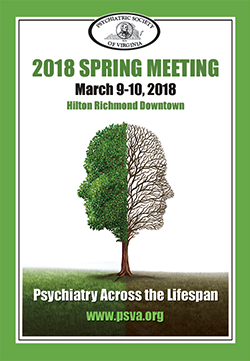Winter 2017 Issue |
|
In the News
Summary of U.S. Opioid Commission’s Final Recommendations
By Kethelyne Beauvais, (EVMS MD Candidate 2019); Stephanie Peglow, DO, MPH
The President’s Commission on Combating Drug Addiction and the Opioid Crisis generated their final recommendations on Wednesday November 1, 2017. Given that it is not uncommon for substance use disorders (SUDs) and mental health disorders to act as comorbid diseases(1,2) and that the report specifically mentions a call to action from psychiatrists and mental health organizations, it is important for providers in the field of psychiatry to be familiar with potential forthcoming changes in the management of SUDs. The 138-page report begins with the Chairman’s letter which summarizes the accomplishments of the current administration regarding this topic and a generalized overview of the committee recommendations, whose goal is to “help doctors, addiction treatment providers, parents, schools, patients, faith-based leaders, law enforcement, insurers, the medical industry, and researchers fight opioid abuse and misuse by reducing federal barriers and increasing support to effective programs and innovation.”(3)
Although the entire report, in some regard, is important for psychiatrists, some relevant highlights include recommendations for recruiting and increasing the number of addiction-trained psychiatrists; allowing SUD treatment via telemedicine; ensuring providers are not only screening for SUDs, but also know how to counsel, refer, and/or treat said patient (within 24-48 hours in certain federal institutions/agencies); revising regulations for informed patient consent before certain opioid prescriptions; standardizing data collection on opioid prescribers and overdose incidents; developing a model training program for all levels of medical education on screening for substance use and mental health status; requiring certain CME courses for prescribers desiring to be relicensed to prescribe opioids; shifting to total electronic prescribing for opioids; removing pain management satisfaction from patient surveys; establishing “drug courts” for certain probation violations; increasing affordability/coverage of SUD treatments; and increasing resources for further research in treatment and prevention. In summary, the report mainly called for expansion and standardization of current practices and continuing research on SUDs.
The organizations called to action in this report include, but are not limited to, the American Society of Addiction Medicine, the Substance Abuse and Mental Health Services Administration, National Institute of Mental Health, National Institute of Drug Abuse, National Institute on Alcohol Abuse and Alcoholism, Health Resources and Services Administration, Drug Enforcement Administration, Office of National Drugs Control Policy, Centers for Medicare and Medicaid Services, National Institute on Corrections, and the Departments of Labor, Justice, Veterans Affairs, and Health and Human Services. Although with a bipartisan committee roster, some critics of the report were frustrated with the lack of specific increased funding appropriation and the lack of support for the expansion of syringe exchange programs.(4,5,6) The Chairman’s Letter, however, does mention early on that “[i]t is not the Commission’s charge to quantify the amount of these resources, so we do not do so in this report,” but rather the letter emphasizes pooling the various sources of federal funding for this crisis into simpler block grants for states.(7)
Below are brief excerpts/paraphrases of the committee’s 56 recommendations (acronyms defined at the end). To send a comment to the commission, email: [email protected]. For further details, the following is a link to the full report: https://www.whitehouse.gov/sites/whitehouse.gov/files/images/Final_Report_Draft_11-3-2017.pdf
Federal Funding and Programs
- Block grant federal funding for opioid-related and SUD-related activities to the states
- Coordinated system for tracking all federally-funded initiatives
- ONDCP review a component of every federal program and necessary funding provided for implementation
Opioid Addiction Prevention
- Student assessment programs like SBIRT in middle school, high school and college levels
- Wide-reaching, national multi-platform media campaign
Prescribing Guidelines, Regulations, Education
- Model regulations that ensure informed patient consent prior to an opioid prescription for chronic pain
- National curriculum and standard of care for opioid prescribers
- Collect data on prescribing patterns matched with participation in CME
- Model training program for all levels of medical education on screening for substance use and mental health status
- Prescribers desiring to be relicensed to prescribe opioids must show participation in an approved CME program on opioid prescribing
- Train pharmacists on best practices to evaluate legitimacy of opioid prescriptions, and not penalize pharmacists for denying inappropriate prescriptions
PDMP Enhancements
- States receiving grant funds must comply with PDMP requirements, including data sharing
- Mandate PDMP checks. Consider amending EMTALA, which requires hospitals to screen/ stabilize patients in an ED, regardless of ability to pay
- PDMP data integration with EHRs, overdose episodes, and SUD-related decision support tools for providers
- Revise regulations and increase electronic prescribing, especially for controlled substances
- PDMPs incorporate available overdose/naloxone deployment data
Supply Reduction and Enforcement Strategies
- Utilize Take Back Day to inform public. Encourage hospitals/clinics/retail pharmacies to be year-round authorized collectors
- Remove pain survey questions entirely on patient satisfaction surveys
- Review/modify rate-setting policies that discourage the use of non-opioid treatments for pain
- Strengthen data collection activities
- Standardize drug testing procedures and forensic/toxicology methods in drug-related deaths
- Reinstitute ADAM and DAWN programs
- Enhance federal sentencing penalties for trafficking fentanyl and its analogues
- Federal law enforcement to target those who produce/sell counterfeit pills
- DEA to regulate the use of pill presses/tableting machines
- CBP/ USPIS to use additional technologies/canines to intercept fentanyl/synthetic opioids
- Use advanced electronic data on international shipments from high-risk areas
- Support Synthetics Trafficking and Overdose Prevention (STOP) Act
- Prevent, monitor and detect the diversion of prescription opioids
- Develop national outreach plan for Fentanyl Safety Recommendations for First Responders and standardize data collection related to first responder opioid-intoxication incidents
Opioid Addiction Treatment, Overdose Reversal, and Recovery
- Incorporate quality measures addressing addiction screenings and treatment referrals. Ensure healthcare providers are screening for SUDs and know how to counsel/refer a patient
- Adopt process, outcome, and prognostic measures of treatment services as presented by the National Outcome Measurement and ASAM
- HHS/CMS, IHS, Tricare, the DEA, and the VA remove reimbursement and policy barriers to SUD treatment, including patient limits, access limits to any forms of FDA-approved MAT, counseling, inpatient/residential treatment, and other treatment modalities, particularly fail-first protocols and frequent prior authorizations. All primary care providers employed by the above-mentioned health systems should screen for alcohol and drug use and, directly or through referral, provide treatment within 24 to 48 hours
- Review/modify rate-setting to better cover the true costs of providing SUD treatment, including inpatient psychiatric facility rates and outpatient provider rates
- Levy monetary penalties on insurers and funders, and launch investigations of health insurers independently for parity violations
- Use a standardized tool that requires health plans to document and disclose their compliance strategies for NQTL parity. Private sector insurers, including employers, should review rate-setting strategies and revise rates when necessary to increase their network of addiction treatment professionals
- NIC, BJA, SAMHSA, and other stakeholders use MAT with pre-trial detainees and continuing treatment upon release
- Establish federal drug courts in all 93 federal judicial districts. Government entities should apply for drug court grants. Individuals with an SUD who violate probation terms with substance use should be diverted into drug court, rather than prison
- Expand the use of recovery coaches. Expand programs for hospital and primary case-based SUD treatment and referral services
- HRSA to prioritize addiction treatment knowledge across all health disciplines. Recruit and increase the number of addiction-trained psychiatrists and other professionals
- Allow for SUD treatment via telemedicine
- NHSC to supply healthcare workers to areas with higher opioid (ab)use
- EMTs to administer naloxone, including higher doses
- Naloxone co-prescribing pilot programs to confirm initial research and identify best practices
- Develop new guidance for EMTALA compliance with regard to treating/stabilizing SUD patients. Provide resources to incentivize hospitals to hire appropriate staff for their ED
- Implement guidelines/reimbursement policies for Recovery Support Services
- Disseminate strategies to keep families together. Research models for pregnant and post-partum women with SUDs and their newborns
- Identify successful college recovery programs. Provide support and technical assistance to increase the number/capacity of high-quality programs
- Develop best practices on SUDs and the workplace for both employers and employees
- Develop model state legislation/regulation to decouple felony convictions/eligibility for business/occupational licenses
- Develop quality standards/best practices for recovery residences
Research and Development
- Engage in a comprehensive review of existing research programs and establish goals for pain management and addiction research
- Additional resources to NIDA, NIMH, and NIAAA to fund the research areas cited above, including long-acting injectables, more potent opioid antagonists to reverse overdose, drugs used for detoxification, and opioid vaccines
- Further research of and fast-track review process for any new Technology-Assisted Monitoring and Treatment for high-risk and SUD patients and SUD patients.
- Commercial insurers and CMS fast-track creation of HCPCS codes for FDA-approved technology-based treatments, digital interventions, and biomarker-based interventions.
- FDA establish guidelines for post-market surveillance
Acronyms
ADAM – Arrestee Drug Abuse Monitoring program
ASAM – American Society of Addiction Medicine
BJA – Bureau of Justice Assistance
CBP – U.S. Customs and Border Protection
CME – Continuing Medical Education
CMS – Centers for Medicare and Medicaid Services
DAWN – Drug Abuse Warning Network
DEA – Drug Enforcement Administration
HCPCS – Healthcare Common Procedure Coding System
HHS – Health and Human Services
HRSA – Health Resources and Services Administration
IHS – Indian Health Service
MAT – Medication-Assisted Treatment
NHSC – National Health Service Corps
NIAAA – National Institute on Alcohol Abuse and Alcoholism
NIC – National Institute on Corrections
NIDA – National Institute on Drug Abuse
NIMH – National Institute of Mental Health
NQTL – Non-quantitative Treatment Limitations
ONDCP – Office of National Drug Control Policy
PDMP – Prescription Drug Monitoring Program
SAMHSA – Substance Abuse and Mental Health Services Administration
SBIRT – Screening, Brief Intervention and Referral to Treatment
SUD – Substance Use Disorder
USPIS – U.S. Postal Inspection Service
VA – Veterans Affairs
References:
- Kelly, T.M. and Daley, D.C. (2013, Aug 26). Integrated Treatment of Substance Use and Psychiatric Disorders. Retrieved from https://www.ncbi.nlm.nih.gov/pmc/articles/PMC3753025.
- Herbeck, D.M., Fitek, D.J., Svikis, D.S., Montoya, I.D., Marcus, S.C., West, J.C. (2008, Dec 10). Treatment Compliance in Patients with Comorbid Psychiatric and Substance Use Disorders. Retrieved from https://www.ncbi.nlm.nih.gov/pmc/articles/PMC2599916.
- Christie, C., Baker, C., Cooper, R., Kennedy, P.J., Madras, B., Bondi, P. (2017, Nov 1). The President’s Commission on Combating Drug Addiction and the Opioid Crisis. Retrieved from https://www.whitehouse.gov/sites/whitehouse.gov/files/images/Final_Report_Draft_11-3-2017.pdf.
- Goodnough, A. and Hoffman, J. (2017, Nov 1). Panel Recommends Opioid Solutions but Puts No Price Tag on Them. Retrieved from https://www.nytimes.com/2017/11/01/health/opioids-trump-commission.html.
- Bernstein, L. (2017, Nov 1). White House Opioid Commission Calls for Wide-Ranging Changes to Anti-Drug Policies. Retrieved from https://www.washingtonpost.com/news/to-your-health/wp/2017/11/01/white-house-opioid-commission-calls-for-wide-ranging-changes-to-anti-drug-policies/?utm_term=.e34a7cbd18fa.
- Johnson, C.K. (2017, Nov 1). Trump Opioid Panel Wants Drug Courts, Training for Doctors. Retrieved from https://apnews.com/ee46b8fab2fa46188c9c3229c410917f/Trump-opioid-panel-wants-drug-courts,-training-for-doctors.
- Christie, C., Baker, C., Cooper, R., Kennedy, P.J., Madras, B., Bondi, P. (2017, Nov 1). The President’s Commission on Combating Drug Addiction and the Opioid Crisis. Retrieved from https://www.whitehouse.gov/sites/whitehouse.gov/files/images/Final_Report_Draft_11-3-2017.pdf.
YOUR NEWSLETTER IS NOW AVAILABLE ON YOUR SMARTPHONE AND TABLET!
JOIN PSV TODAY!
REGISTER TODAY!
PSV 2018
SPRING MEETING
March 9-10, 2018
Hilton Richmond Downtown
Richmond, Virginia
APA Find a Psychiatrist
Are you accepting new patients?
Opt into APA’s “Find A Psychiatrist” database. To view the functionality or opt-in, CLICK HERE
FYI: A link for this option has been added to the PSV website so the public can find you when they are looking for help.







